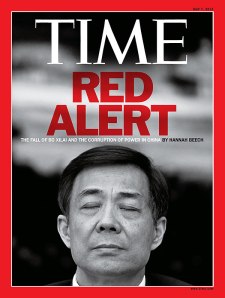A few weeks ago, I attended a fascinating lecture at my school on recent power politics in China. The talk was given by John Garnaut, a China media correspondent and author of The Rise and Fall of the House of Bo. (You can read more about him and see the details of the program I attended here.) Basically, he talked about the Bo Xilai scandal and trial that took place in summer 2013. It’s quite complicated, so if you want some more details, you can read about it on the Wikipedia article on Bo here, or check out this useful timeline from BBC of the most important events. If you’re a fan of political drama and intrigue, look no further than the Bo Xilai case: truly, the best writer in Hollywood could not have cooked up a more deliciously twisted storyline!
Even though my understanding of this very complex scandal is quite limited, I thought that Garnaut managed to make the topic pretty accessible and also talked about some very interesting and more general aspects of Chinese politics which I will discuss here.
As Garnaut pointed out, Chinese politics are often viewed by outsiders as an inaccessible and impenetrable “Black Box”. Generally speaking, the seven members of the Politburo Standing Committee of the CCP and other government officials are selected in a highly secretive process, and, in fact, most of Chinese politics operate within this very opaque system. Garnaut argues that the Bo Xilai scandal was a game-changer in Chinese politics because it was carried out mostly in the public eye with a higher degree of transparency; not because the policies of the CCP have changed, but because the landscape of China’s politics itself has evolved and transformed. China has a huge and active community of netizens who, despite the efforts of Chinese censors, are accessing twitter and Sina Weibo, the Chinese microblogging platform. By doing so, these netizens are exposing and engaging with political scandals (and creating a total PR nightmare for the Propaganda Ministry!) Even five years ago, this level of citizen engagement would have been unfathomable in Chinese politics. Garnaut even pointed out that in some cases, netizens were more aware and knowledgeable of the details of the Bo Xilai case than former President Hu Jintao! Garnaut insisted that social media has really widened the bandwidth of information gathering in China, and it would be impossible to put the Bo Xilai scandal back into the “Black Box” of Chinese politics.
Garnaut also discussed the factional divisions within Chinese politics, which, although fascinating, are highly complex and intricate. Given the transparency issues, it is hard to get a sense of the web of connections, or 关系 (guanxi) that determines one’s fate in the political arena in China. I’m not really going to delve into the issue of factionalism too deeply here, except to say that Garnaut referred to former President Jian Zemin as “The Godfather” of Chinese Politics, which I though was a humorous and accurate characterization!
The latter portion of Garnaut’s lecture focused on current President Xi Jinping, who assumed office in March of 2013. He is quickly emerging as a departure from previous Chinese politicians with an increased attention to the PLA. As Garnaut said: “If Bo Xilai’s fall redefined Chinese society, Xi Jinping’s rise redefined it yet again”.
I found Garnaut’s talk quite insightful and enlightening especially given the complexities of the issues he dealt with. I haven’t read his book yet, but it is definitely on my list!


fascinating!!